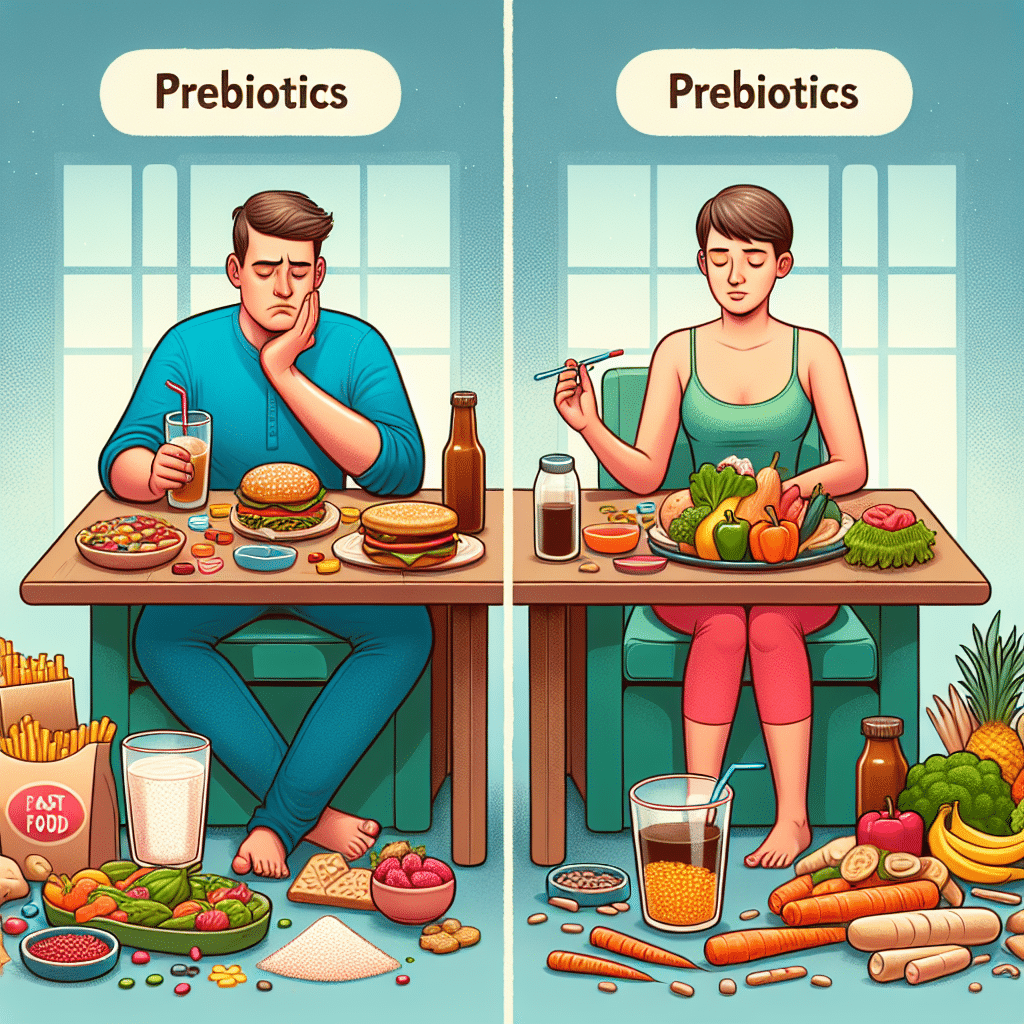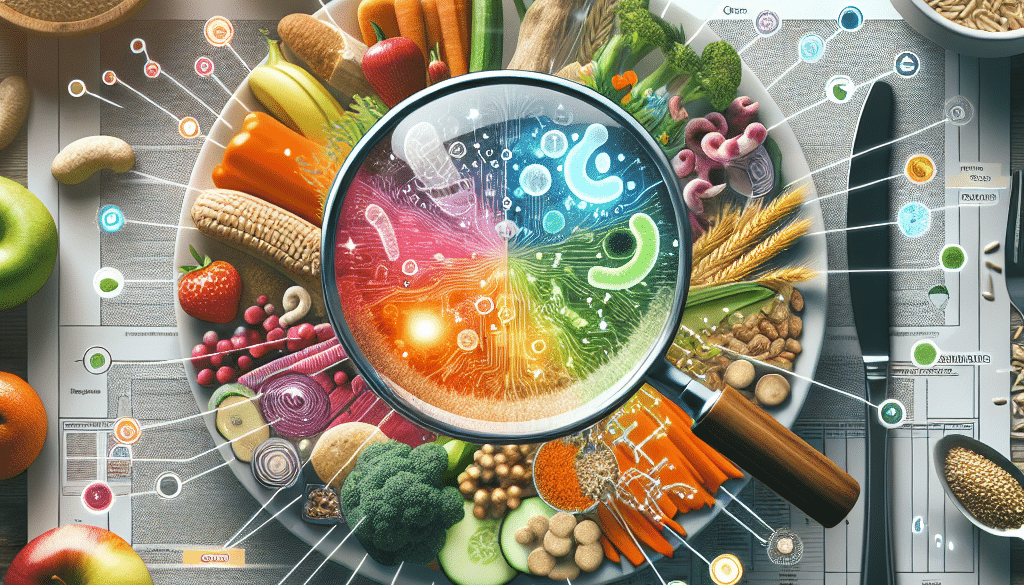The Importance of Prebiotics in Your Diet
-
Table of Contents
- Prebiotics: Essential Fuel for a Healthy Gut
- Understanding Prebiotics and Their Role in Gut Health
- Key Benefits of Prebiotics
- Prebiotic Sources in Your Diet
- The Science Behind Prebiotics and Gut Health
- Case Studies and Research Findings
- Integrating Prebiotics into Your Daily Routine
- Prebiotics: A Key to Long-Term Health
- Prebiotics and Chronic Disease Prevention
- Prebiotics and Mental Health
- Conclusion: Embrace Prebiotics for Optimal Health
- Enhance Your Diet with ETprotein’s Plant-Based Protein Products
Prebiotics: Essential Fuel for a Healthy Gut

Prebiotics are a type of dietary fiber that play a crucial role in maintaining gut health. Unlike probiotics, which are live beneficial bacteria, prebiotics serve as food for these bacteria, helping them to thrive and maintain a balanced gut microbiome. This article delves into the importance of prebiotics in your diet, exploring their benefits, sources, and the science behind their impact on overall health.
Understanding Prebiotics and Their Role in Gut Health
Prebiotics are non-digestible fibers that pass through the upper part of the gastrointestinal tract and stimulate the growth or activity of advantageous bacteria in the large intestine. By doing so, they contribute to a myriad of health benefits, including improved digestion, enhanced immune function, and reduced risk of certain diseases.
Key Benefits of Prebiotics
- Enhanced Digestive Health: Prebiotics promote the growth of beneficial gut bacteria, which can lead to improved bowel regularity and a reduction in digestive disorders.
- Boosted Immune System: A healthy gut microbiome supported by prebiotics can enhance the body’s immune response and protect against pathogens.
- Better Nutrient Absorption: The fermentation of prebiotics by gut bacteria produces short-chain fatty acids, which can improve the absorption of essential nutrients like calcium and magnesium.
- Weight Management: Prebiotics can help regulate appetite and metabolism, potentially aiding in weight management efforts.
- Reduced Inflammation: The anti-inflammatory properties of short-chain fatty acids produced from prebiotic fermentation may help reduce systemic inflammation.
Prebiotic Sources in Your Diet
Incorporating prebiotics into your diet is relatively simple, as they are found in many common foods. Some of the richest sources include:
- Chicory root
- Garlic
- Onions
- Leeks
- Asparagus
- Bananas
- Barley
- Oats
- Apples
- Flaxseeds
The Science Behind Prebiotics and Gut Health
Scientific research has consistently highlighted the importance of prebiotics in promoting a healthy gut microbiome. Studies have shown that prebiotics can increase the abundance of beneficial bacteria, such as Bifidobacteria and Lactobacilli, which are known to have positive health effects.
Case Studies and Research Findings
One study published in the “Journal of Nutrition” found that the intake of prebiotic fibers led to significant increases in Bifidobacteria in humans. Another research article in “Gut Microbes” highlighted that prebiotics could help manage obesity and metabolic disorders by altering the gut microbiota composition.
Statistics from the World Gastroenterology Organisation suggest that dietary fiber, including prebiotics, is consumed below recommended levels in many populations, emphasizing the need for increased awareness and intake of these important nutrients.
Integrating Prebiotics into Your Daily Routine
Adopting a diet rich in prebiotics doesn’t have to be challenging. Here are some simple tips to increase your prebiotic intake:
- Start your day with a bowl of oatmeal topped with bananas or apples.
- Include garlic and onions as a base for soups, stews, and sauces.
- Snack on foods like hummus with raw asparagus or flaxseed crackers.
- Add chicory root fiber to your coffee or smoothies.
- Choose whole-grain products like barley and oats over refined grains.
Prebiotics: A Key to Long-Term Health
While the immediate effects of prebiotics on gut health are well-documented, their long-term impact on overall well-being is equally significant. By supporting a healthy gut microbiome, prebiotics may play a role in preventing chronic diseases, improving mental health, and enhancing longevity.
Prebiotics and Chronic Disease Prevention
Evidence suggests that a diet rich in prebiotics may reduce the risk of developing chronic diseases such as type 2 diabetes, cardiovascular disease, and certain cancers. The mechanisms behind this protective effect are linked to the modulation of the gut microbiota and the systemic anti-inflammatory responses elicited by prebiotic fermentation.
Prebiotics and Mental Health
The gut-brain axis is a communication network that links the gut microbiome with the brain. Prebiotics, by fostering a healthy gut environment, may influence this axis and contribute to improved mood and cognitive function. Research in the field of psychobiotics is exploring the potential of prebiotics as a novel approach to treating mental health disorders.
Conclusion: Embrace Prebiotics for Optimal Health
In conclusion, prebiotics are a vital component of a healthy diet, offering numerous benefits for gut health and beyond. By understanding their role and incorporating them into your daily routine, you can support your digestive system, immune function, and overall well-being. Remember to aim for a diverse range of prebiotic-rich foods to nourish your gut microbiota and unlock the full potential of these powerful dietary fibers.
Enhance Your Diet with ETprotein’s Plant-Based Protein Products
If you’re looking to complement your prebiotic intake with high-quality protein, ETprotein offers a range of plant-based protein products that can fit seamlessly into your health-conscious lifestyle. Their organic and non-GMO protein powders, including rice, pea, and pumpkin seed proteins, provide a neutral taste and allergen-free options suitable for various dietary needs.
Whether you’re involved in sports nutrition, weight management, or simply seeking to improve your overall health, ETprotein’s products can serve as a valuable addition to your diet. By combining the benefits of prebiotics with the nutritional advantages of plant proteins, you can create a balanced and nourishing meal plan that supports your health goals.
About ETprotein:
ETprotein, a reputable plant protein vegan protein Chinese factory manufacturer and supplier, is renowned for producing, stocking, exporting, and delivering the highest quality organic bulk vegan protein and plant proteins. They include Organic rice protein, clear rice protein, pea protein, clear pea protein, watermelon seed protein, pumpkin seed protein, sunflower seed protein, mung bean protein, peanut protein etc. Their offerings, characterized by a neutral taste, non-GMO, allergen-free attributes, cater to a diverse range of industries. They serve nutraceutical, pharmaceutical, cosmeceutical, veterinary, as well as food and beverage finished product distributors, traders, and manufacturers across Europe, USA, Canada, Australia, Thailand, Japan, Korea, Brazil, and Chile, among others.
ETprotein specialization includes exporting and delivering tailor-made protein powder and finished nutritional supplements. Their extensive product range covers sectors like Food and Beverage, Sports Nutrition, Weight Management, Dietary Supplements, Health and Wellness Products, and Infant Formula, ensuring comprehensive solutions to meet all your protein needs.
As a trusted company by leading global food and beverage brands and Fortune 500 companies, ETprotein reinforces China’s reputation in the global arena. For more information or to sample their products, please contact them and email sales(at)ETprotein.com today.












